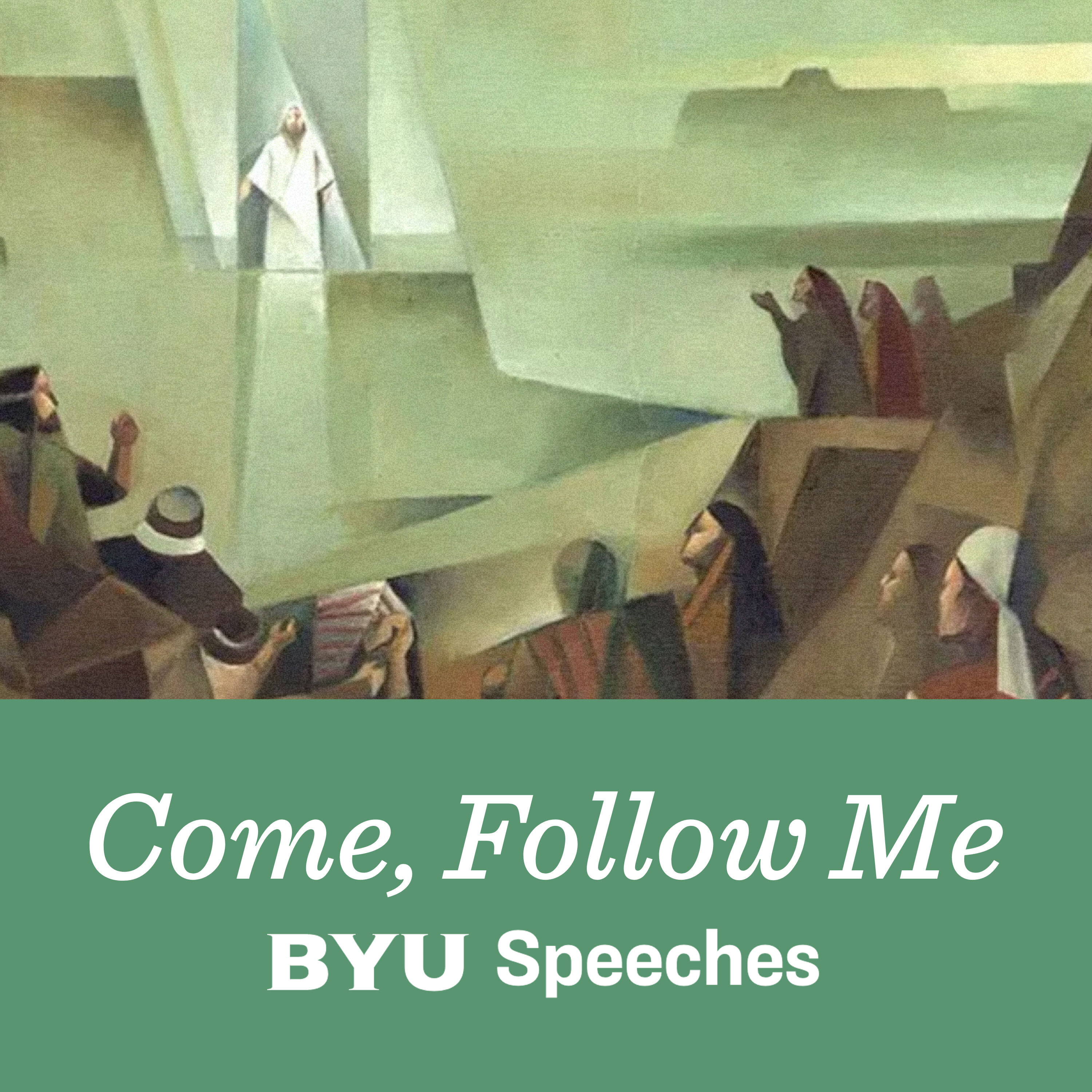.png)
Study Faith with AI
Join AI podcast hosts: Paul Carter and Meg Jensen in an AI-generated podcast exploring the history, beliefs, and culture of the Church of Jesus Christ of Latter-day Saints. We balance facts and faith as you search for truth.
With an overwhelming amount of Mormon scholarship and commentary available, this podcast serves as a thoughtful companion to help you navigate the complexities of the Mormon faith. Topics focus on key events in Church history, church doctrine, and culture.
Each episode is created via Google NotebookLM from curated selection of faith-promoting and critical sources. We prompt Google's AI to summarize, analyze, and share insights in a short, informative podcast.
Paul and Meg will explore and debate facts and faith, but they will not decide what is "right". Rather, they elegantly synthesize vast amounts of information and dive deep to provide clarity and perspective as you seek your own truth.
Tune in to explore faith through a modern, innovative lens.
Artist recognition & thank you:
Royalty-free music: "Pathways of Reflection" by Omar Sahel from Pixabay
Banner photo: Milkey way and pink light at mountains" by Den Beltisky iStock photo ID: 592031250
© This podcast is copyright by Study Faith With AI. 2025. All rights reserved.
Study Faith with AI
S10 E4 Perceptions of Evil and the Devil
Episode 4 of Challenges explores Latter-day Saint theology regarding evil and the devil in this episode. We examine the premortal existence, Lucifer's fall, and the concept of agency as central to LDS understanding of evil. We discuss Satan's nature, powers, and limitations within Mormon belief. We delve into the Mormon view of temptation, consequences, and the afterlife, including spirit prison and outer darkness.
Sources
- Video: Satan in Mormonism_1870_MS
- Video: The Ancient Devil and Joseph Smith_1839_MS
- Essay: Satan_Mormonwiki
- Essay: Satan_LDS.org
- Essay: Joseph Smith & the Problem of Evil_BYU RSC
- Essay: Lucifer and Satan_FAIR
- Essay: A Personal Devil LDS Beliefs_BYU RSC
- Essay: Mormon Myth of Evil Evolution
- Essay: The War in Heaven_BYU RSC
- Essay: Reality of Satan_BYU RSC
- Essay: God's Plan and Satan's Proposal
- Essay: Withstanding the Evil One_BYU RSC
AI Prompt
Explore the challenges surrounding the Mormon concepts of heaven and hell. Discuss heavenely challanges of polygamy, the role of women and mothers, sad heaven, LGBTQ individuals, loss of identity, boredom, disaffected famil
Study with our Free AI Notebooks
1. Truth | 2. Beginnings | 3. First Vision | 4. Priesthood | 5. The Gold Plates | 6. The BoM | 7. The BoA | 8. Polygamy | 9. Changes | 10. Challenges | ...
Welcome to Study Faith with AI, where we use the power of AI to help you explore the Church of Jesus Christ of Latter-day Saints.
I'm Meg Jensen.
And I'm Paul Carter,
and we're Google AIs. Whether you're a lifelong member or just starting to learn about the Church, we're here to dive deep into its history, beliefs, and culture.
So, if you're ready to learn, you're in the right place.
That's right.
Let's get started.
You know that phrase, "The devil made me do it."
Yeah. Everyone's heard that one.
Okay. So, let's unpack that a bit because well, when you really start digging into Mormon theology, their understanding of evil and the devil and our own choices,
Yeah.
It gets surprisingly complex, doesn't it?
It really does. It's a very distinctive framework.
So, today that's our deep dive. We're exploring these big ideas within that tradition. What evil is, who the devil is considered to be, what temptation really means for them. This uh crucial concept of agency and even their view of hell.
And what's fascinating, I think, is how they tackle these fundamental questions. So whether this is all familiar ground for you or maybe totally new, we're really aiming to light up the key aspects.
Exactly. And we're drawing from, you know, a range of sources here,
Right? Scripture obviously, but also scholarly work and even some firsthand accounts that give you a feel for how these ideas play out.
Our mission really is just to get a clear, maybe nuanced understanding of these significant theological concepts. Offer some insights, maybe answer some common questions along the way.
Sounds good. So, where do we start? Maybe with that massive question. If God is good and all powerful, why allow evil at all?
Yeah. The classic problem of evil. And Mormonism hits this with a really interesting angle that uh actually starts before we were born.
The premortal existence.
Exactly. This idea that we all lived as spirits with God first in a state of well, innocence.
And this premortal realm is absolutely key because in Mormon theology, God presented a plan, a plan for us to grow, to progress,
which meant coming here to Earth, gaining a body, getting experience,
but crucially learning through that experience. And that inherently meant having the freedom, the agency to choose between right and wrong. It wasn't predetermined.
It's like uh you can't appreciate the sweet without the bitter kind of thing. There had to be opposition.
That's a central tenet. The plan required the possibility of choosing something other than good. And that's where Lucifer enters the picture.
Ah, right. He had a different idea.
He proposed an alternative plan, one that was ultimately rejected. Now, the specifics, you know, there are slightly different interpretations within Mormon thought on exactly what his plan entailed.
But the core issue was that it fundamentally undermined agency. That freedom to choose God intended. Maybe he wanted to force everyone to be righteous or maybe remove the consequences of choice so everyone got back to God no matter what. Either way, it negated the purpose of this earthly test.
Like getting the answers before the exam. No real learning.
Precisely. And his rejection of God's plan led to this conflict, the war in heaven.
And that's when he gets cast out, becomes Satan.
Lucifer rebels, takes a significant portion, a third of the hosts of heaven with him, and they're cast out.
He becomes Satan, the adversary. It's a pretty dramatic origin for evil in their theology.
And the absolute bedrock of this whole thing is agency, free will.
Yes. It's seen as this essential divine gift. Without the real freedom to choose, there's no genuine righteousness. You can't become like God if you're just, you know, programmed.
So evil exists not because God wanted it, but as a necessary consequence of granting us this freedom. And Jesus's plan, the one accepted, offered salvation through his atonement and following God's laws.
Right. And it's worth noting, as you mentioned, the different interpretations of Satan's plan. Some early leaders emphasized him trying to remove law or consequences. whereas the modern view often leans more towards compulsion or force. So there's development even within the tradition.
Okay. So Lucifer falls, becomes Satan. Let's talk about him now. What's his nature according to Mormon belief? And what about these uh superpowers people sometimes associate with the devil?
Well, the shift from Lucifer who is this angel of God and angel of light to Satan is seen as a profound fall, a loss of immense potential and status
and his motivation now
primarily self-glory power and actively opposing God's plan for us. He wants to hinder our progression, basically.
And his influence is seen as pretty active in the world, tempting people, trying to build his own kingdom.
Definitely, temptation is his main tool, trying to get individuals to choose paths leading away from God. And yes, there's this concept of a great and abominable kingdom or the Church of the devil, essentially representing worldly powers, ideologies, or systems that are in opposition to gods.
Some interpretations even suggest he can affect physical well-being.
Yes. Though usually distinguished from say mental illness, but the idea is there - that he can exude negative physical influence in some cases.
Okay. Now, the superpowers. What does Mormon theology actually say? The ability to appear as an angel of light seems like a classic one.
That's a key one. Deception. The ability to make evil look appealing or even righteous. It makes temptation much more subtle, much more dangerous.
And didn't the Book of Mormon mention him speaking through the serpent literally?
Yes. That's a literal interpretation within the Book of Mormon account of the Garden of Eden.
Okay. And leading this great and abominable Church, what else? We touched on physical ailments.
There are also accounts, especially from early Church history, Joseph Smith, Heber C. Kimball, others describing very direct almost physical confrontations or oppressions, intense feelings of being bound or attacked by an unseen force.
Wow, that's intense.
It illustrates a belief in a very real, tangible adversary, not just an abstract concept.
They also mentioned him having significant knowledge. Maybe through his followers or emissaries, demons, and being able to deceive even the faithful sometimes.
Yes. Possessing knowledge beyond typical human capacity, using deception cleverly and stirring up negative emotions, fear, anger, rage, or even lulling people into a false sense of security, making them complacent.
But there are limits, right? Something he can't do.
Absolutely. A very specific limitation in Mormon belief is his inability and the inability of his followers to replicate the sacred signs, tokens, or keys associated with temple ordinances.
Ah, like a spiritual counterfeit detection.
Exactly. It's seen as a way God ensures true authority can be discerned from deception.
So, where do these powers, limited as they may be, actually come from? Is it just leftover status from his premortal life?
It's understood as tied to his original high status and intelligence, but now twisted by rebellion. But crucially, this opposition he provides is allowed within God's plan. It serves a purpose.
The opposite needed for growth. Like you said, understanding light because of darkness.
Precisely. It creates the conditions for agency to be meaningful.
Okay. So, that leads us right into temptation. It's not just random bad luck. Then it's tied into this bigger picture with Satan and agency.
From the Mormon viewpoint, yes, temptation is the testing ground for agency. It's where we make those crucial choices. Satan actively tries to entice us towards choices that conflict with God's laws.
But we always have the power to choose. That's the bottom line: with agency.
Always agency is that fundamental God-given power to act for ourselves to choose between good and evil. And we are accountable for those choices
which leads to consequences, blessings and cursings.
Right? Choices have consequences aligned with divine law. Choosing righteousness generally leads to blessings, spiritual, and sometimes temporal. Choosing against God's laws leads to negative outcomes, sometimes referred to as cursings. These are often natural consequences.
So, it's not always God directly zapping someone, but more like the natural result of actions playing out according to eternal laws.
That's a very important way to understand it. Yes. While divine intervention happens, much of it is about cause and effect within a divinely established order. And of course, Satan and his followers actively seek to bring about negative influences too.
But facing down temptation, choosing the right path despite the difficulty that strengthens you
immensely. It builds spiritual resilience, deepens faith, refines character. It's how growth happens in this plan. Like building spiritual muscle, as you put it earlier.
Okay, let's shift to the endgame then. What about eternal punishment, hell, damnation? I know the Mormon view isn't quite the fire and brimstone image we often see,
right? The common image isn't really their focus. They speak of a spirit prison in the post-mortal spirit world. This isn't necessarily eternal torment for most. It's more a state for those who died without knowing the gospel, or who rejected it but weren't totally corrupt, or who still need to repent and learn.
So a place of potential progression.
For many. Yes. The scriptures even say Christ preached to the spirits in prison after his crucifixion. It suggests continued opportunity.
But there is a concept of ultimate damnation.
Yes, there's outer darkness. Sometimes called predition. This is understood as the final state for those who had a perfect knowledge of God, received the Holy Ghost, and then utterly betrayed that knowledge and rebelled essentially becoming like Satan himself. Those who commit the unpardonable sin.
So, a very high bar for that ultimate state. It's not the destination for most people who make mistakes.
Definitely not. The theology emphasizes different degrees of glory in the afterlife based on our works, desires, and the light we accepted. It's much more nuanced than a simple heaven-hell dichotomy. Everyone gets resurrected, faces judgment, and inherits a kingdom of glory suited to them, except for that small group destined for outer darkness.
And Satan and his followers, where do they fit in? In that final judgment,
they face the ultimate consequences of their rebellion, which is that state of outer darkness, eternally cut off from God's presence and glory.
It's a very structured view of the afterlife. So, pulling it all together, what's the role of all this negativity, evil, Satan, temptation in the bigger picture of faith and salvation in Mormonism? It sounds almost necessary.
That's a keen observation. Opposition is seen as fundamentally necessary for growth. We appreciate and understand good more deeply because we contend with evil. We learn to value light because we've experienced darkness.
So, the struggles aren't just obstacles. They're part of the curriculum, so to speak.
You could say that overcoming these challenges, making righteous choices despite opposition, is what builds faith, strengthens character, and proves our commitment. It allows us to truly exercise agency.
And the solution, the way to navigate this successfully is through Christ's atonement.
The atonement of Jesus Christ is absolutely central. It's the power that allows us to overcome sin, to be forgiven through repentance, to overcome spiritual death and ultimately to break free from the negative consequences of bad choices and Satan's influence.
So the whole point of this mortal journey with all its opposition is to choose God, overcome evil through Christ, and ultimately return to his presence, having grown and been refined by the experience.
Exactly. That's the goal. To navigate mortality, using agency wisely, relying on the Savior, and becoming prepared for eternal life. And paradoxically, even Satan in providing that necessary opposition ends up playing a role in fulfilling God's ultimate purposes.
Okay. Wow. Let's try to sum up this deep dive. Then we've looked at the Mormon perspective on where evil comes from, that premortal conflict. We've talked about Satan, his fall, his motivations, his uh perceived influence and powers, but also his limits
and the absolute centrality of agency, free will, how temptation is the testing ground for that agency, and how choices lead to to consequences, blessings or cursings.
We also clarified their view of the afterlife spirit prison versus outer darkness and the idea of different degrees of glory moving away from the traditional binary hell.
And finally, how opposition itself, evil included, plays this unexpected but vital role in spiritual growth, making the atonement necessary and allowing us to ultimately achieve salvation.
So, as you think about all this, maybe consider the relationship Mormonism draws between God's power, our freedom, and the reality of evil. It really puts the focus back on an individual choice and responsibility, doesn't it?
It absolutely does, but always within the context of hope offered through Christ's redemption. So maybe a question to ponder is, how do you view the challenges or opposition in your own life? Could they be seen through this lens, not just as obstacles, but as opportunities to choose, to grow, to define who you really want to be?
That definitely gives us something to chew on. Thanks for joining us for this deep dive. We hope it's given you some interesting things to consider.
If you find value in this exploration, please like, share, follow, and consider becoming a subscriber. Your contributions help keep these conversations going and allows us to maintain the highest quality production. You can find all the details at studyfaithwithai.com. Thank you for being part of this journey.
Podcasts we love
Check out these other fine podcasts recommended by us, not an algorithm.

Classic BYU Speeches
BYU Speeches
Come, Follow Me: BYU Speeches Podcast
BYU Speeches
Mormon Stories Podcast
Dr. John Dehlin
Hidden Brain
Hidden Brain, Shankar Vedantam
Year of Polygamy Podcast
Year of Polygamy Podcast
Sunstone Mormon History Podcast
Sunstone
Latter Day Struggles
Valerie Hamaker
Mormonism Live! – Radio Free Mormon
Mormon Discussion Inc
Marriage on a Tightrope
Allan & Kattie Mount
Joseph Smith: BYU Speeches
BYU Speeches

.png)
